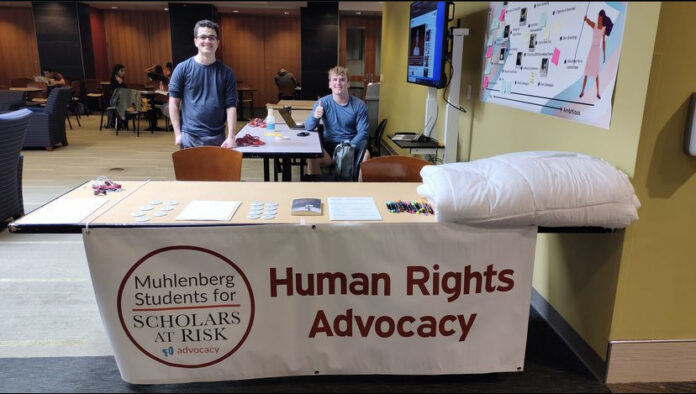
On April 15, members of the student body of the College participated in Advocacy Day. Students currently in their RJ Fellows Senior Seminar and students part of the course Rights, Refugee and Resettlement: Scholars at Risk Seminar spent the semester researching a respective scholar that the non-governmental organization, Scholars at Risk (SAR), had been advocating for. The semester was filled with research and preparation for Advocacy Day, to advocate for the release of these scholars from their respective incarcerations.
Muhlenberg students were working on behalf of four different scholars, each with their own unique cases that centered around the censorship of their academic work and life. The first scholar was G.N Saibaba, Ph.D. Saibaba was an English professor in India who had been imprisoned without evidence under India’s Unlawful Activities Prevention Act. The students representing Saibaba stated in their advocacy plan, “Although Professor Saibaba is released, the circumstances by which he was arrested still exist and pose a current threat to himself and to any other scholar whose views of academic and personal freedoms are contrary to the Indian government. We are raising awareness that release from jail is not the end goal in the fight for academic, expressive and human rights.”
The entire concept surrounding Advocacy Day and SAR is the idea of academic freedom. In both classes, academic freedom and the preservation of such freedoms and rights has been the focus area and has grounded the work each student is contributing. Especially at a time when the overall political and social climate has been littered with turmoil and there have been higher tensions at universities across the globe among academics in how they can express their thoughts. Therefore, the advocacy efforts students engaged in were for a wider struggle of preserving academic freedom and understanding its establishment as a human right.
Another scholar students were focused on was Abduljalil Al-Singace, Ph.D. Al-Singace is a Bahraini scholar and a retired professor of mechanical engineering at the University of Bahrain, who has been sentenced to life in prison. This came after Al-Singace was participating in a pro-democracy protest in March 2011, when authorities arrested Al-Singace and he has been imprisoned ever since. Students advocating on his behalf wrote, “We are tabling to get a sense of how students feel about academic freedom and to encourage community members to petition proper officials to lobby for Al-Signace’s release.”
Students were tabling in the Light Lounge of Seegers for the majority of the morning and into the late afternoon. The tables held different information and handouts on scholars that ranged from informational pamphlets to poetry written by the scholars to pins advocating for release. There was also a talkback organized for Niloufar Bayani by the students advocating for her case, where Brian Mello, Ph.D., and Kate Richmond, Ph.D., joined to speak about incarceration and academic freedom. Students advocating for Bayani wrote, “The group will discuss the wrongful imprisonment of Iranian sustainability scholar Niloufar Bayani and her recent release.”
The last scholar students had been advocating for was Ahmadreza Djalali, Ph.D. Djalali’s students were tabling to raise awareness as well as collecting signatures for a petition they intend to send to the Swedish government in support of his release. Students wrote, “Professor Ahdmadreza Djalali is a scholar of disaster medicine who was wrongfully arrested in Iran while participating in a series of academic workshops. He was sentenced to death for corruption on Earth. While awaiting execution, he spends long periods in solitary confinement, which has greatly impacted his health. We are trying to raise awareness about his case and unlawful conviction and to collect signatures on a petition urging the Swedish government to fight for Djalali’s release.”
Many academics and scholars see their work as a form of art and expression of what they are passionate about. The censorship of academic thought not only puts academics in potentially life-threatening situations and institutions based around violence, but it also completely suppresses them from indulging in what they are passionate about, what they have dedicated their lives to. Saibaba speaks to this in the poetry he wrote while imprisoned, because as much as he desired to be let out, what he desired most was to return to his classroom, to continue doing what he loves.
Shinam ‘25 is a political science and sociology major at Muhlenberg. She is immensely excited to be apart of the Weekly staff! When she isn’t writing, she can be found reading a book or watching a comfort show with her favorite fast food!























Here at home in the US scores of academics from prestigious institutions were, under the direction of government agencies, denied the right to speak and write on public platforms about the issues of Covid’s origins, vaccine efficacy and approval processes, masking, distancing. Is there no concern about that academic freedom on college campuses?